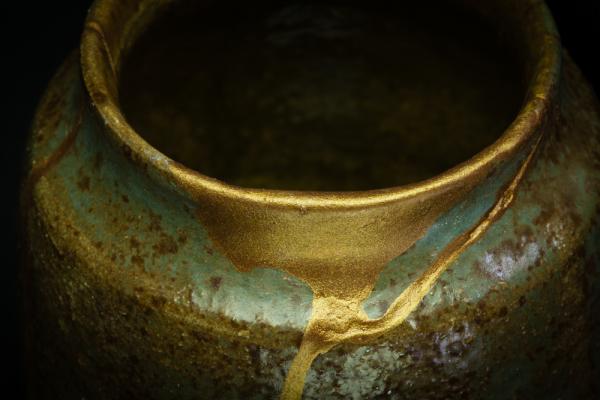In Psalm 31, we read these searing words, “I have become like broken pottery.” (Ps. 31:12) The imagery is piercing. I think we all have been responsible at one point in our life for breaking a piece of glass or pottery. We know the jagged edges. We feel the little chips in our feet. We know the anxiety as we try to pick up every little piece. “I have become like broken pottery.”
And if we allow the metaphor to be used for our own life, we can feel the pottery cutting great wounds within us. We know something about sharp edges that form and not only hurt us, but hurt those around us, so we stay still and voiceless. We feel the little bits of glass tearing at our feet as we try to walk even a few steps of faith. Certainly, we know the anxious thoughts as we try to pick up the various pieces of our lives strewn all about. “I have become like broken pottery.”
Right before our broken vessel image the psalmist has this to say: “Be merciful to me, Lord, for I am in distress; my eyes grow weak with sorrow, my soul and body with grief. My life is consumed by anguish and my years by groaning; my strength fails because of my affliction, and my bones grow weak … I am the utter contempt of my neighbors and an object of dread to my closest friends— those who see me on the street flee from me. I am forgotten as though I were dead.” (Ps. 31:9-12) For those of us who have experienced our lives in a thousand pieces tossed with wild abandon across the floor, we can see our own cries and groans in these heart-wrenching words from our psalmist. We know how our eyes can barely open because of how many tears have been shed. We know the groans that we moan day after miserable day. We know the weakness that happens where we can barely stand. We feel the loss of friend after friend because it all got too sad. We know how we are the forgotten ones where we wonder if anyone will remember us again. “I have become like broken pottery.”
But our psalmist does not stay in the middle of the broken pieces of their life. The psalmist somehow finds a thimble’s worth of faith and states: “But I trust in you, Lord; I say, ‘You are my God.’ My times are in your hands…” (Ps. 31:14-15). And I have to wonder how many minutes … how many hour s… how many days … went by before the psalmist said these words. Did these words just roll off the psalmist’s tongue or did our psalmist have to muster up the energy, the faith, and the courage to say these words of unmitigated trust? How long is it before they were able to lift their head to say to God “despite all of my surroundings — all of my wounds — all of my brokenness … “But – I – Trust – In – You – O – Lord!”?
Every other week I have the honor of talking with men, who are now my friends, on death row. When we meet, they share with me how they know more than their share of being broken pottery. These friends know what it is like to have the pieces of their lives strewn about to the point that it is near impossible to gather up all the bits and pieces. My dear ones know the gravity and overwhelming weight of grief. They share with me how weak they have become over the sheer weight of riding this roller coaster called life. My friends know what it is like to have those closest to them say they can’t be present anymore. And somewhere in our time together, the broken me meets the broken them. We do not bring our “all-togetherness” to our time together — we both know that only our authentic self will do. We realize that our authentic self is a broken self in need of God’s healing. Miraculously, healing does happen as broken self meets broken self. God enters in as we know we are indeed in God’s hands.
At some point, we look at each other and call one another “beloved” friend. The word from God to Jesus at Jesus’ baptism is our word for each other — beloved. We too are God’s beloved. We are God’s beloved whether we are a broken mess or whether we have our act together. And I am very grateful that Jesus, God’s beloved, knows something about open wounds as he still carries those wounds on his body. “I have become like broken pottery.”
And yet, and yet, I am still dearly beloved! Hallelujah!
Got something to say about what you're reading? We value your feedback!







